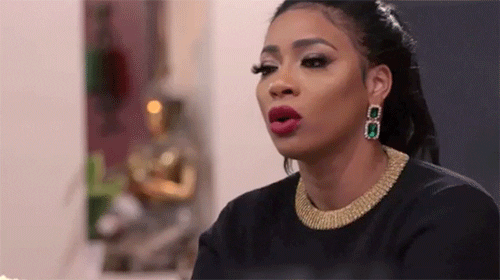
Recently, while talking to someone in my world about their marriage, they shared with me that, while they typically have a huge appetite for sex, because there has been a real breakdown in their connection with their spouse as of late, they haven't been in the mood. "Something that marriage teaches you is that sex really needs to have a strong emotional connection," they told me. "I had a lot of great sex when I was single, but nothing beats when the chemistry and connection are there with your spouse. Once you've had that, anything less is settling. And so, until my partner and I can get back on the same page, I'm just not interested in 'going through the motions'."
Because I know so much about what is going on in that marriage right now, I get why they are currently at their resolve. After all, while sexless marriages are traditionally not beneficial to a couple, neither is the misuse/abuse of make-up sex.
Ask any husband or wife who has a truly fulfilling sex life and they will totally vouch for the fact that that the best kind of sex is when the mind, body and spirit are in sync; when one of these components is lacking, copulation is compromised.
That's why I wrote articles on this platform like "10 Wonderful Reasons Why Consistent Sex In Marriage Is So Important", "8 'Kinds of Sex' All Married Couples Should Put Into Rotation", "What Exactly Is 'Orgasmic Meditation'?", "Are You Ready To Apply Your Love Language To Your Sex Life?" and "9 Sex-Related Questions You & Your Partner Should Ask Each Other. Tonight.". All of these are reminders that sex isn't supposed to be merely a mechanical act; it has to go far deeper than that.
That's why I am broaching to the topic of a mindful orgasm today. Because, while any orgasm is pretty damn dope (I mean, c'mon now), folks who've had the extreme pleasure of experiencing a mindful one would say you are truly missing out if you haven't had one too. Here's why. And how.
What Exactly Does It Mean to Be “Mindful”?

To me, "mindful" is the kind of word that we all should want to apply to our lives, across the board. When it comes to a basic definition of what the word means, when we are a mindful individual, it means that we are choosing to live in the moment. When it comes to sharing a quote that I think describes mindfulness quite well, it would have to be one by the Roman emperor and philosopher Marcus Aurelius. He once said, "Do every act of your life as though it were the very last act of your life." It speaks to being purposeful. It speaks to being intentional. It also speaks of not taking one single moment of life for granted. Ever.
So, how can you know if you are someone who at least strives to be mindful?
- You believe in a Higher Power which keeps you from trying to control what you cannot.
- You areextremely self-aware (or at least try to be).
- You do not allow fear, worry and anxiety to run your life.
- You don't spend a lot of time complaining because, more times than not, it's a total waste of time.
- You try to resolve conflicts or issues as soon as possible.
- You enjoy the "little things" that happen around you.
- You've made peace with the fact that you're not perfect nor is anyone else which, in turn, makes you more patient and compassionate (to yourself as well as towards others).
- You strive to master the art of going with the flow.
- You are far more interested in giving than receiving, knowing that the universe always rewards the good that you do.
- You typically focus on now until the "next now" arrives.
Whew. When you stop to really take all of this in, mindfulness seems like a huge "exhale" and "woosah", doesn't it? It brings a whole new meaning to "why sweat the small stuff?" and "why miss out on today by focusing so much on tomorrow?"
Because of this, mindful people tend to be calmer than most. They are also loving, respectful and accepting (including self-accepting). Know what else? Mindful individuals have a certain level of healthy intensity to them too. Since they are fully aware of the fact that right now is all that they really and truly have, they usually experience things on a very profound and passionate level. Everything is something special—because they choose to see it as so.
And when you look at mindfulness from this angle and perspective, doesn't it make perfect sense that their sex life—including their orgasms—would truly be some next level ish?
How Can Mindfulness Take Your Orgasms to Another Level?

If, in theory, you can grasp a surface-level concept of how being mindful has the ability to produce some pretty earth-shattering climaxes but still, you're needing a little bit more help to take it all in, let's briefly apply all 10 of the points I just made to your sex life specifically.
- If you believe in a Higher Power and you also believe that Power is who created sex (I am a Bible follower, so I totally believe that God created sex because the Bible says so in Genesis 1:26-27), then you will honor sex as being something that is spiritual, not just physical.
- If you are self-aware, then you know what your strengths and weaknesses are, even sexually (like you might be really great at oral sex but you're timid when it comes to trying new things). You also know what works for you sexually and what doesn't.
- If you don't get consumed with fear, worry and anxiety, then you don't do a lot of "pre-thinking" (other than incorporating safer sex practices, of course) when it comes to sex. You let it happen as it comes.
- If you don't complain a lot, you're not always brooding or stressing over past sexual partners or experiences. You're more interested in what you and your partner can do to make the next time better; not what happened in the past that was less than stellar.
- If you don't hold grudges, then you don't withhold sex as a way to "punish" your partner. You work to find compromise and peace so that the two of you can always remain close and connected; including sexually.
- If you enjoy the little things, then, on the sex tip, you're not an "orgasm chaser". What I mean by that is, while orgasms are desired, they aren't the main goal; you and your partner enjoying one another is and every little thing that cultivates pleasure is welcome.
- If you embrace imperfection, then you're not hung up on body image issues when it comes to you or your partner. You don't care about having flaws. In fact, some of each other's imperfections are what you like the most because those are some of the things that make us all unique. By embracing this reality, you and your partner can be more at ease.
- If you go with the flow, sex doesn't always have to happen at a certain time, in a specific place. Nor does it always have to go the same way. You don't expect anything other than extreme closeness. Beyond that, what will be will be.
- If you and your partner are more interested in giving pleasure than receiving it, selfishness isn't a big issue in your sex life. And that is ALWAYS beneficial.
- And finally, if you are solely into the here and now, then you are 1000 percent present with your partner, from beginning to end, when it comes to the sex that the two of you choose to engage in. And because of this, the stage is set to have an orgasm that isn't forced, isn't "judged" and isn't filled with preconceived notions or expectations.
Now go briefly back over these 10 points again. If you really take a moment to take all of this in, I bet you can see how and why a mindful orgasm can be the best you and your partner will probably ever have. I bet you can also better grasp how to make a mindful orgasm happen too. But just to be perfectly sure, how about a few pointers?
Here’s How to Have Your First Mindful Orgasm
 Giphy
GiphyNow that the foundation has been laid for how to bring mindfulness into your bedroom (or wherever you like to get it in), give me a couple of minutes to provide a few tips on how you can have your very first mindful orgasm (if you don't think you've ever had one before).
First, it's important to keep in mind that, no matter how many orgasm hack articles you might read (including the ones that are on this site), it's not really going to matter much if your mind isn't in the right place.
There are plenty of health-related articles that share the fact that things like anxiety, unrealistic expectations, poor body image issues can impede orgasms. So, it's important to remember that, before even engaging with your partner, you need to be good with yourself if you want a mindful orgasm to take place (sex journaling can help you in this area, by the way).
Second, since being mindful is about being—and staying—in the moment, what is the freaking rush? Practices like orgasmic meditation, affirming one another, listening to sensual music, giving your partner a lingam massage, encouraging him to get to know your sexual pressure points, kissing, cuddling, oral sex marathons—basically getting off the clock and just taking the time to take each other in (even down to listening to the sounds that your partner makes) are all acts of foreplay that can put you both at ease while helping you both to focus more on just being together than setting a goal to have an orgasm in 30 minutes or less.
Lastly, encourage you and your partner to pay close attention to peaks of pleasure. I don't mean what you're saying and doing when on the brink of an orgasm. What I'm talking about is what are the things that the both of you enjoy most before even getting to that point and place? Whatever those things are, get some edging (which is bringing someone to the point of climaxing and then stopping so that their orgasms will be intensified) going by extending those acts while telling your partner what you adore the most about them sexually.
For instance, if you really enjoy having your inner thighs kissed, encourage your partner to also share what they enjoy so much about doing that to you, right in the moment of doing it. Then, when you feel like you can't take it anymore, switch up and do something that brings him extreme satisfaction while professing what turns you on, so much about him, in the moment as well. If the two of you do this, at least a couple of times, you'll both feel sexy, safe and ready for intercourse. And, because of all of these factors that are working so seamlessly together, a deeply intense orgasm could very well be only a few moments away.
And that, my dear, is what gets you to a mindful orgasm.
If you were really paying attention to all of this, you probably noticed that a mindful orgasm has less to do with your partner or even sexual technique. It's more about simply being at peace with yourself and the moment that you are in—moment by moment. Trust me, if mindfulness is something that you choose to make a part of your daily life, I'd be shocked if, not only will it be easier to have orgasms but you'll not want less than a mindful orgasm every time. Practice some mindfulness today. Watch what that could do for your orgasms tonight. Whew.
Join our xoTribe, an exclusive community dedicated to YOU and your stories and all things xoNecole. Be a part of a growing community of women from all over the world who come together to uplift, inspire, and inform each other on all things related to the glow up.
Featured image by Giphy
- What To Do When Your Partner Is Too Big And Sex Is Painful ... ›
- What Sex Workers Need You To Know About Their Careers ... ›
- Activate Your Sex Goddess With Crystal Dildos - xoNecole ... ›
- I Tried Cannabis Lube - Here's Why You Should Too - xoNecole ... ›
- What Exactly Is 'Orgasmic Meditation'? - xoNecole: Women's Interest ... ›
- How Can I Tell If I've Had An Orgasm - xoNecole: Women's Interest, Love, Wellness, Beauty ›
- What Is Mindful Sex? - xoNecole: Women's Interest, Love, Wellness, Beauty ›
- What Is A G-Scale Orgasm - xoNecole: Women's Interest, Love, Wellness, Beauty ›
- What Sex Workers Need You To Know About Their Careers - xoNecole: Women's Interest, Love, Wellness, Beauty ›
Your December 2025 Monthly Horoscopes Are All About Surrender & Alignment
December is about letting go. We end the year with the need for more peace, reflection, and rejuvenation, and that is exactly what December is providing for us. The Sun is in Sagittarius, and anything is possible. This is the month to believe in that and to know that the universe is supporting you. With a Supermoon in Gemini as we begin the month as well, we have an opportunity to gain the closure we have been looking for this year and to wrap up old projects, ideas, and communication breakthroughs.
This is the month to make your peace the priority and let go of trying to control the way the tides are turning. Trust in your new beginning, and give yourself time to prepare for it this month.
A big part of the clarity that is coming through this month is due to Neptune going direct in Pisces on December 10, after being retrograde here since July. With Neptune now direct, we are able to see our inspiration and creativity a little more clearly, providing the perfect energy for dreams and manifestation to be built upon. The smoke is clearing, and it’s up to you to decide what you want to do with this newfound clarity that this transit is bringing. Mercury also moves back into Sagittarius on December 11, which is great for communication and clarity, and the adventures you were trying to see through at the beginning of November come around for you again with greater purpose and support.
On December 15, Mars enters Capricorn until the end of January 2026, and this is the extra push we need to make important changes and to be on the path towards greater abundance, stability, and prosperity. Mars in Capricorn takes care of business, and we have extra energy at our disposal during this time to do so. This transit is an ideal time to focus on your career or financial goals for next year and to start putting some of these plans into motion now. A few days later, we have the New Moon of the month, which will be in Sagittarius on December 19, and this is the perfect New Moon to manifest.
The energy is high, magic is in the air, and it’s all about moving forward with the new beginnings that are inspiring you and bringing you joy to think about right now.
Capricorn Season officially begins on December 21, and this earth sign energy is how we heal, gain closure, and build new foundations in our world. With Venus also moving into a Capricorn a few days later, there is something about peace, prosperity, and security that we are gaining in life and in love as we close out the year, and this is what we need right now. This month is about reflecting on what was, letting go of old hurt, and renewing. December is an ending and a new beginning in one, and there is magic in this space to be created.
Read for your sun and rising sign below to see what December 2025 has in store for you.
 AriesKyra Jay for xoNecole
AriesKyra Jay for xoNecoleARIES
December is a full-circle moment for you, Aries. You are seeing the gifts in your world and have a lot of gratitude for the way things have come about for you as of late. There are culminations in your world that are providing you with more abundance, stability, and community, and you are exactly where you are meant to be this month. With the Sun in a fellow fire sign and in your 9th house of travel for most of the month, December is a good time to get out of your comfort zone, explore the world around you, and get your body moving.
Mars, your ruling planet, also makes a change and moves into Capricorn on December 15, which will fuel your inspiration and power in your career space. You are making a lot of professional progress as we close out the year; however, make sure to be more mindful of your competitive drive right now. The New Moon on December 19 is the perfect opportunity for you to create some new plans and goals when it comes to traveling, education, and where you want to gain some new inspiration in your world. Overall, this is a month of things coming together for you serendipitously.
 TaurusKyra Jay for xoNecole
TaurusKyra Jay for xoNecoleTAURUS
December is about trusting your intuition, Taurus. You have a lot on your mind this month, and it’s best to delegate, communicate, and allow yourself some relief by opening up to someone and not feeling like you have to hold everything in. As we begin the month, we have a Supermoon in Gemini happening in your house of income, and the plans and projects you have been building here come to fruition for you now. This is the time to gain clarity on your financial world and to take a look at what spending habits you want to let go of here as well.
With Venus in your 8th house of shared resources for most of the month, you are doing a cleanse on your commitments, partnerships, and business ventures. You are taking a look at what you want to dedicate yourself to in the future, and what commitments you may need to let go of now in order to be in the space you truly want to be, both financially and within some of your relationship dynamics. Before we end the month, we have a New Moon in this same area of your chart, and it’s time to look at the opportunities that are presenting themselves and to trust your internal guidance system to lead you forward.
 GeminiKyra Jay for xoNecole
GeminiKyra Jay for xoNecoleGEMINI
You are moving forward fearlessly this month, Gemini. December is your month of love, passion, and dignity, and you are owning the light that you shine. We begin the month with the last Supermoon of the year, happening in your sign, and you are stepping up to the plate. You are showing up, owning how much you have grown this year, and allowing yourself to heal while also acknowledging that you have done your best and you deserve to have fun in the midst of the changes you are creating.
Mercury, your ruling planet, is officially out of retrograde, and you can use this energy to the fullest potential now. With Mercury in your 7th house of love, it’s time to speak from the heart and to talk about the things that matter and that are inspiring you right now to your loved ones. You never know what kind of epiphanies you may have when you open up the conversation to others. Before the month ends, you have a New Moon in this same love area of your chart, and this New Moon is all about manifesting romance, commitment, and abundance in your world.
 CancerKyra Jay for xoNecole
CancerKyra Jay for xoNecoleCANCER
December is an opening for more love, more joy, and more freedom in your life, Cancer. You have come to a place where you hold so much gratitude in your heart for where you are today and where your heart is shining, and things come together for you with more ease right now. With the Sun in your 6th house of health, work, and daily routines for most of the month, you are getting your ducks in a row while also putting more energy and effort into taking care of yourself, your priorities, and your well-being. This month surprises you in many ways, and it’s because you are showing up.
Mars and Venus both move into your house of love, relationships, marriage, and abundance this month, and you are making strides in your love life. You have both of these opposing forces on your side and are being recognized for the love you are while also receiving the love you want. This month, overall, is about focusing more on the positives in your world and letting your heart have its joy. Before December comes to an end, there is a New Moon in Sagittarius, and this is the perfect opportunity to create the plans you want to see through next year, especially when it comes to your work life, colleagues, business ventures, and health.
 LeoKyra Jay for xoNecole
LeoKyra Jay for xoNecoleLEO
The scales of karma are balancing, and they are balancing in your favor this month, Leo. December is your month of truth, and of seeing it clearly in your world. The Sun is in your house of romance, pleasure, and happiness for most of the month, and it’s time to relax, be in the present moment, and allow what is meant to be, to be. With a Supermoon in your 11th house of manifestation as December begins, this is a powerful month for seeing your dreams come to fruition, and for feeling like the intentions you have set this year are finally here for you now.
Mars also moves into your 6th house mid-month, and this is the perfect energy to have to move into the new year. You have extra energy at your disposal right now and are feeling fearless with what is possible for you and your daily routine. Before the month ends, we also have a New Moon in a fellow fire sign, Sagittarius, and this is a breakthrough moment for you and your heart. December, overall, wants to show you how loved and supported you are and will be doing so in magical, unexpected, and concrete ways.
 VirgoKyra Jay for xoNecole
VirgoKyra Jay for xoNecoleVIRGO
December is a month of victory, Virgo. You are showing up and experiencing some new successes in your world that move you forward on your path in life. With a Supermoon in your 10th house of career as we begin the month, the effort and intentions you have made this year come into full bloom, and you are being recognized for who you are and the good work you have done. This month is all about showing up and allowing yourself to be seen and loved, knowing that you deserve the support and opportunities you are receiving.
Mars moves into Capricorn on December 15, which brings the passion and excitement into your love life, hobbies, and little pleasures in life that light you up. You want to have fun this month and are going to be walking into the new year with this fearless, happy, and spontaneous energy within you. Before the month ends, Venus also enters Capricorn, and in this same area of your chart, you have a lot to look forward to and believe in right now. Overall, December wants you to be happy and will be doing everything possible to make that happen for you. This is your month to shine, Virgo.
 LibraKyra Jay for xoNecole
LibraKyra Jay for xoNecoleLIBRA
December is a month of opportunity for you, Libra. New doors open, and you are financially making breakthroughs this month because of it. December begins with a Supermoon in your 9th house, and you are getting a clearer view of where you have been making strides in your life and how it has all brought you here to this present moment of freedom. This month is showing you what happens when you are fearless with your purpose and when you believe in yourself and what you are worthy of.
Moving further into December, Mars moves into your 4th house of home and family mid-month, and you are closing out the year in your safe spaces. You are spending more time with your loved ones and taking the time to quiet your mind and listen to what your heart has been telling you. Before the month ends, we have a New Moon in Sagittarius, happening in an area of your life that deals with communication. This is a great time for getting the answers you have been looking for and for feeling more clear-headed and confident about the decisions you are making as you move into the new year.
 ScorpioKyra Jay for xoNecole
ScorpioKyra Jay for xoNecoleSCORPIO
Patience is a virtue this month, Scorpio. December is all about remaining patient and vigilant with what you are creating in your world, and knowing that the universe has your back. It’s time to be reminded of the power of hope, and this month is an opening to greater clarity in your life. There is a lot of energy in your financial zones right now, and this is providing you with new opportunities and new insight; however, the speed at which things come about for you may feel daunting. Keep your head up and eyes focused on what you want and know that you are more than worthy of receiving it.
With Mercury in your 2nd house of income this month, December is a good time to plant new seeds and to think about where you want to be financially a month from now or even a year. This month is asking you to think bigger and to think more long-term so that you can set the appropriate plans into motion now. We also have a New Moon in your house of income before the month ends, and this is when you will see more of your dreams come to fruition in this area of your life, and have more opportunities to build. Overall, December will be teaching you a lot, Scorpio.
 SagittariusKyra Jay for xoNecole
SagittariusKyra Jay for xoNecoleSAGITTARIUS
Sagittarius Season is here, and there is a lot in store for you this month, Sag. December is all about what you are dedicating yourself to. It’s about setting your intentions and putting the work in to back up your dreams, and about getting things in order so that when the new beginnings come, you are ready for them. The Sun and Venus are in your sign for most of this month, and there are a lot of eyes on you right now. You have the potential to create a new beginning for yourself, and it’s time to invest in yourself, your love life, and your dreams.
Mercury moves into Sagittarius on December 11, and this is giving you another opportunity to see through some of the plans that you had initiated in November. Mercury was retrograde in your sign last month, and there may have been some disruptions to your vision and plans for the future, and now this energy is turning around for you. Before the month ends, we also have a New Moon in Sagittarius, and you are walking through new doors fearlessly. You are catching others by surprise by your growth this month, and you are thinking a lot about your purpose, future, and plans for the new year.
 CapricornKyra Jay for xoNecole
CapricornKyra Jay for xoNecoleCAPRICORN
December is all about the vision, Capricorn. You are moving through a lot of changes and transformations this month, yet they are giving you a chance at a new beginning in the process. You are focused more on the future and what goals you want to manifest for yourself right now, and are ready to let go of what hasn’t been working for you. With the Sun in your 12th house of closure for most of December, this is your time for healing, but remember, healing doesn’t have to be isolating or boring; you can thrive while you renew, and you are this month.
Mid-month, the excitement picks up for you, and you are feeling more energized than you have in a while. Mars moves into Capricorn until the end of January 2026, and you are being proactive with your goals, intentions, and passions. You are a force to be reckoned with this month, and you are making things happen for yourself with confidence. Capricorn Season officially begins on December 21 this year, and this is definitely speeding up your healing process. You are breaking free from what was, and with Venus also moving into Capricorn before the month ends, you are leaving this year in high spirits and with love opening a new door for you.
 AquariusKyra Jay for xoNecole
AquariusKyra Jay for xoNecoleAQUARIUS
December is all about community, creativity, and manifestation, Aquarius. This is the month to work together with others to help bring your dreams to life. You are in a space of inspiration, empowerment, and beauty, and are creating more of this energy around you and in your world. Look out for what support comes your way this month and know that you don’t have to do everything alone to succeed. With the Sun in your 11th house of manifestation and friendship, your intentions are coming to fruition, and it’s time to celebrate with the people you love and to own how far you have come this year.
On December 19, we have a New Moon in Sagittarius, lighting up your life in all of the best ways possible. This is your New Moon of freedom, victory, and magic, and you are seeing new beginnings appear that you were once just hoping for. Before the month comes to an end, Venus moves into your 12th house of closure, and after an active and successful month, you are ready to relax, heal, and give your heart some of the attention it has been asking for. You are moving into the new year with the need to release and renew what hasn’t been working in your relationships, and you are finally ready to.
 PiscesKyra Jay for xoNecole
PiscesKyra Jay for xoNecolePISCES
December is a big month for you, Pisces. You are making some huge accomplishments this month, and are feeling like everything you have been through this year has been worth it for these moments that are coming to fruition for you now. The Sun is in your 10th house of career and reputation for most of the month, and this is where a lot of your focus is right now. You are claiming your successes and putting yourself out there in ways that not only serve you, but that inspire others as well.
Neptune officially goes direct on December 10, after being retrograde in your sign since July, and you are finally seeing things a little more clearly. You are feeling renewed inspiration and passion in your life, and your intuition is your strongest asset right now. Before December comes to an end, we also have a New Moon in your 10th house of career, and what happens now not only changes things for you in the present, but it also opens new doors and what is possible for you in the new year as well. Overall, you are on top of your game this month and are owning the joy and empowerment you feel.
Featured image by Kyra Jay for xoNecole
Why The Cayman Islands Is The Ideal Soft-Life Island-Hopping Destination
It's always a pleasure to add a new stamp to the passport, especially when it's an opportunity to visit a country you've never been to. When invited to explore the Cayman Islands, I was very familiar with Grand Cayman—the largest among the three islands, known for its stunning clear-blue beaches, and modern city comforts—but I seriously slept on Cayman Brac.
On a six-day trip, I knew Grand Cayman would be that girl, but the smaller sister island Cayman Brac? She’s the captivating, low-key spot that is a whole soft-life fantasy.
This trip was my first time in the destination, via the Cayman Islands Department of Tourism (@visitcaymanislands) and it had all the luxe chill and exploration that makes for great memories that will prompt anybody to want to return again and again. Plus, it was the tail end of rainy season, which is basically my jam because off-peak travel makes me feel like a VIP. I get the beauty, the beaches, the food, the people—without the crowds and noise.
Let’s get into how you can pack your Cayman Islands itinerary with cultural exploration, elevated cuisine, deep restoration, and an island-hopping adventure along the way.
GRAND CAYMAN
Grand Cayman hits you with that effortless island confidence from the moment you land. It’s the largest of the Cayman Islands, known for crystal-clear Caribbean waters and a culture that blends British influence with laid-back island charm.
Visitors pull up for Seven Mile Beach, stingray encounters, fresh seafood, and those luxe resorts and villas that make unplugging way too easy.
Where To Stay

Courtesy/Grand Cayman Marriott Resort
Grand Cayman Marriott Resort: This property offers ocean views, polished comfort, with easy access to everything near Seven Mile Beach. (Marriott stays are often a go-to for me when I’m in the mood for a resort stay where the standards are consistent no matter the destination).
The spacious rooms, warm staff, and a pool area perfect for quick resets between adventures were a hit for me. Despite the patchy rain, lounging by the pool felt like a reset button.
I popped into the gift shop and found pieces from Isy B, the Cayman-based brand created by Isy Obi, a Black woman who pivoted from finance to fashion. The designs are bold, colorful, full of vibes I love to reference when returning home.
Botanica Luxury Cottages: The cluster boutique cottages blend island-chic décor with modern touches. My cabin had vaulted ceilings, washer and dryer, roomy showers, a cozy lounge area, and a private outdoor nook with stylish umbrellas and seating perfect for reading, sunbathing, or unwinding. A pool is just a short walk away on the property and Seven Mile Beach was just a quick drive. I took a two-mile stroll along the shoreline where families, chilled-out tourists, and sleek beach clubs lended to a balanced and laid-back but lively environment.

Courtesy/Botanica Luxury Cottages
Where To Eat
Pom Pom: This breezy rooftop lounge serving curated cocktails with a relaxed, stylish vibe and mellow music was the perfect evening welcome to the island. And the sunsets are divine.
Avecita Chef’s Table: It’s an amazing multi-course dining experience where chefs craft global flavor fusions right in front of you. Expect bubbles, bold tastes, and an ambiance that feels refined without being pretentious. This is one experience I definitely plan to fly back to Cayman for in the new year.
Pepper’s Bar & Grill: Conveniently located just across the street from the resort, it’s a local casual spot with live music and unique takes on Caribbean meal staples. The Cayman-style jerk pork was a favorite.
Ristorante Pappagallo: Set on a 14-acre bird sanctuary overlooking a saltwater lagoon, this brunch delivered everything from sushi to risotto to curry goat to barbacoa tacos. The white tablecloth elegance paired with homestyle warmth and peaceful water views made the whole experience feel elevated yet comforting.Bacaro
Bacaro: This is where we had our farewell dinner, enjoying their Venetian-inspired small plates and curated cocktails. If you want a final night with your partner or even your best girl group, this is the spot.
Things To Do:

Courtesy/Island Soul
Floating Sound Bath with Island Soul: The floating meditation was calming, grounding, and deeply restorative. We had the sky and breeze as a backdrop and listened to music, prompts and chimes that allowed us to simply float and be.
Anchor & Den Cocktail Class at the Grand Cayman Marriott Resort: I thoroughly enjoyed this lively, hands-on cocktail-making session which would be fun for couples, friends, or anyone wanting a playful evening activity without leaving the property.
The Grove: This is a foodie and art-lover's delight with its dining and culture scene that features spots like Island Naturals, a chill café with plant-forward dishes—where the mushroom tacos were everything, and the tuna poke nachos are a must—and upscale spots like Mykonos Steak Club. After eating, stop by Carlos Garcia’s gallery, a working studio and public exhibition space that supports a collective of local and international artists, and regularly hosts events, pop-ups, and live painting.
Pirates Week Festival: This was a welcome surprise addition to our itinerary, and it's an event held in November across the Cayman Islands, with the major events happening in the heart of Grand Cayman's George Town. During the finale, I was out there jumping and whining to Nessa Preppy and Faith Callender, rum in hand, surrounded by locals and pure island joy. As a woman who loves soca, that moment lit me up. It was the perfect last hurrah with a slice of home, culture, and celebration.
Bonny Moon Beach Club: It’s a Tik Tok-famous stylish beachfront lounge experience that, for me, actually matched the good reviews. The octopus ceviche and everything from the woodfired portion of the menu were a hit and the DJ added the right amount of energy. We ate just steps from the ocean. It's swanky, atmospheric, and ideal for date night, girls’ trips, or baecations.
CAYMAN BRAC
Known for dramatic limestone cliffs, caves, and some of the best diving in the Caribbean, the vibe in Cayman Brac is slower, more local, and perfect if you want nature, real island culture, and adventure without the crowds. I took a quick Cayman Airways flight from Grand Cayman and spent two days there.
The visit was honestly one of the most peaceful, soul-nourishing parts of my trip. The moment I landed, the island reeled me in—raw, mysterious, almost cinematic in its quiet beauty. There’s a softness that feels like an alluring secret.
Where to Stay

Courtesy/Le Soleil d'Or
Le Soleil d’Or: This is a farm-focused boutique haven with luxury villas, a restaurant, a pool, and its own beach club. Our villa was huge, complete with a kitchen, living room, laundry space, game room, and the modern luxury master suite of my dreams.
The bathroom had a soaking tub that fit my 5’7"-plus frame, a large shower, and his-and-her sinks. The bedroom had tons of storage, a large comfy bed, and a mini fridge, plus a TV lounge and veranda opening to the pool. Honestly, my suite could’ve been a full studio apartment back home—I was blown away.
The farm-to-table meals, which I could enjoy at the restaurant just steps away from my suite, were rich, fresh, and soulful. My morning walks on the property were serene, wrapped in nothing but nature and quiet.
If you want an escape from the tourist and business buzz of Grand Cayman, this is the perfect hideaway for a baecation, girls trip, or solo venture.

Courtesy/Le Soleil D'Or
Things To Do & Good Eats
Rock Iguana Yoga: This soothing yoga and therapeutic art experience was set in lush island terrain and was a grounding, earthy immersion that eased my back pain from stress, and was a great quiet time to reflect and release. The instructor was patient, graceful, and welcoming.
Le Soleil D’Or Beach Club: It's a chill open beachfront that offers a peaceful, quiet experience in the off season. Think serene solitude, gentle waves, and open space to unwind—far from the typical beach club scene with loud DJs, pumping music, and high-energy crowds.
Star Island Restaurant: This restaurant reminded me of my favorite local spots in Jamaica where you can get food with spices and tastes like your Caribbean grandma or auntie made the meals with love. The menu includes Caribbean dishes like jerk chicken and Cayman's national dish, stewed turtle.
I’ve been to several islands across the Caribbean—with my tried-and-true all-time favorite being Jamaica—and I must say, if you want that soft-life island-hopping luxury adventure paired with opportunities to connect with a rich arts, music, and culinary scene, a trip to the Cayman Islands is exactly that.
Featured image via Shutterstock









